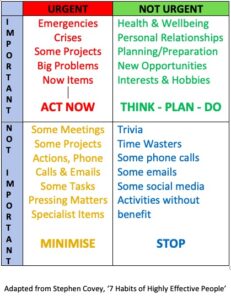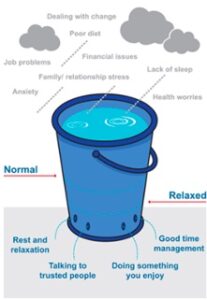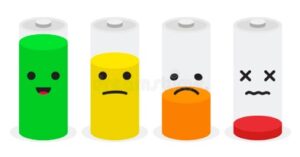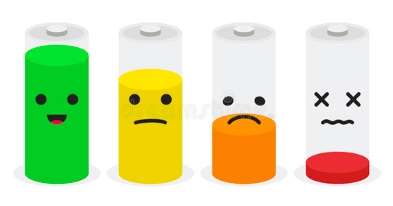
Many of my coaching clients and people who attend my mental wellbeing workshops ask for help in creating a healthy work-life balance. They talk about feeling overwhelmed, being ‘out of control’ and never having enough time in the day to do everything that needs to be done. I tend to agree that life can often be challenging, but I also wonder if we also sometimes create our own problems?
Perhaps there’s a clue in the commonly used term, ‘work-life balance’. Notice how we put ‘work’ before ‘life’. Does it say something about our thinking and how we create our lifestyles? Do we need to adjust our thinking, our words and our actions?
People often say, ‘You can’t have your cake and eat it.’ You can’t have it all in life. That’s true of course, to a degree. We all have choices to make. The key to a balanced lifestyle is, therefore, to consistently make the right choices at the right time.
I like cake and I certainly want to eat it. But I also know that, if I eat too much cake and don’t balance my diet with a healthy variety of fruit and vegetables, I will suffer the consequences. So, I need to enjoy an occasional slice of delicious homemade lemon drizzle and a chocolate brownie for a treat, but not eat a whole cake every day. There’s a lesson to be learned there in how we manage our whole lifestyle – it’s all about creating a balance.
In coaching a number of very busy people who are often experiencing overload and stress, I’ve noticed that it definitely is possible to help them create a more balanced lifestyle. That people can have a busy, successful career and still maintain a healthy personal life, but it’s something that needs to be constantly worked-on and addressed in a focused, self-disciplined manner.
One of the most useful coaching tools in helping us to create a healthy, balanced lifestyle is the principle of putting ‘First Things First’. The matrix below defines common activities in accordance with their levels of urgency and importance. Activities in the red section, for instance, are both ‘important’ and ‘urgent’ and therefore must be addressed immediately. Whereas activities in the green section are ‘important’ but not necessarily ‘urgent’, in that they can be acted upon at a later date. The problem for most of us is that the items in the green section are often those we would say are ultimately the most important but, because they aren’t urgent, we tend to put them off until tomorrow – and we all know that ‘tomorrow never comes’.

We therefore need to put ‘First Things First’ by:
- Placing the activities that appear in the green section firmly in the centre of our lives. That doesn’t mean we can spend all day every day doing just those activities, but it does mean that we make sure they happen on a regular basis. This will provide you with vision, balance and a strong sense of purpose.
- Manage time in the Orange Section. Minimising them, as far as reasonably possible, using various time management techniques. Exert control rather than being a victim.
- Stop activities in the blue section. Be very honest with yourself and stop activities that don’t add value to your life.
- The Red Section will, subsequently, become smaller and have less of an impact on your life.
My other top tips would be to actively manage your ‘stress bucket’ and your ‘personal battery’ on a daily basis. Both are basic self-help tools but using them regularly will definitely help to bring a sense of balance and control to your life.
Imagine your mind as being like a bucket that fills-up with various negative stressors. Maintain an intuitive mental picture of the level of stress in your bucket and take action to control it by making sure you undertake activities that will put holes in your bucket to lower the stress level. You probably already know what helps you, the challenge is to do it on a regular basis until it becomes an a relatively easy habit that you enjoy.

Also, monitor your ‘personal battery’ and recharge it regularly. Just as you recharge your electronic devices, you need to regularly top-up your personal battery. Keep yourself in the green rather than dropping into amber or red.

Health, Fun and Rest matter. Recharge using whatever activities work best for you.
Work in Focused Bursts. Divide yourself between complete focus and complete rest. It can be tempting to cope with heavy workloads by working longer hours, but performance tends to drop as you get fatigued.
Complete Tasks in One Go. Be efficient and effective. Do a job well first time, so that it doesn’t need to be revisited.
Whenever possible, complete the most important or complex tasks when your energy levels are at their highest and leave more routine tasks for when you have less energy.
Move tasks that you tend to put-off to the top of your priority list and get them done! You may find they were not as difficult as you expected and you will have more mental energy for other purposes, rather than using it to contain your anxiety about doing jobs you don’t like doing.
Take note of all these useful time management tools. They can be applied to both personal and professional circumstances. Experiment and practice with them to learn how to use them to best effect. Different situations and personal preferences mean that we need to select the right tools to suit specific needs.
Adapt the tools as necessary and, whatever the circumstances, do not allow yourself to be a victim! Then you really can ‘Have Your Cake and Eat It!’
—————–
Brian Tregunna is a highly-acclaimed Life Coach, therapist, trainer, mentor and facilitator. He works with individuals, groups and organisations to help people achieve their full potential.
He regularly helps people to address a wide range of challenges, including: mental wellbeing, self-confidence, motivation, workplace performance, business development, career progression, gaining employment, health & fitness, personal relationships, assertiveness, public speaking, time management and much more.
Brian Tregunna 07856571163 tregunnalifecoaching@gmail.com

